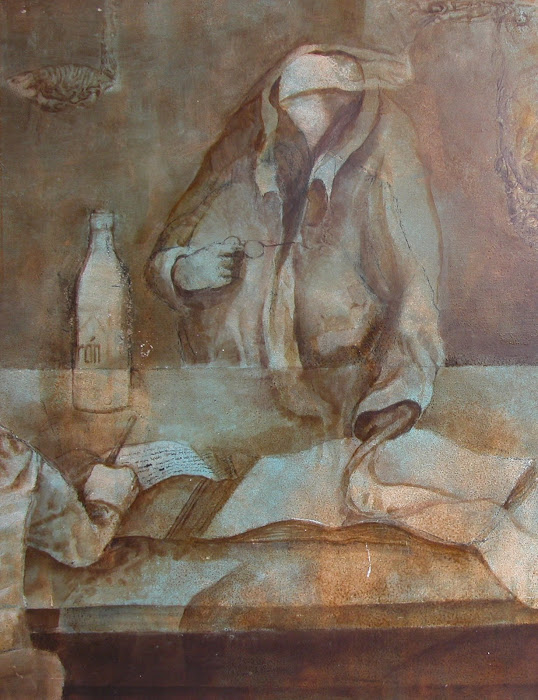Hace
ya 26 años que se publicó en francés la traducción de mi libro “Senara”
gracias al buen hacer de la profesora Roseline Salvarrey, profesora del
Lycee Jean Brito en Bretagne y de la facultad de letras de Rennes. En
él participaron alumnos y otros colegas como L. E tienen, E. Gendron y
G. Guibert. Les seguiré agradeciendo siempre este hermoso trabajo que se
completó con una lectura de mis poemas en Rennes. Más de medio siglo
ya. Senara se había publicado dos años antes en 1996, en la editorial Antonio Ubago de Granada, donde también habían publicado Martín Recuerda, Juan Eslava Galán, Fernando de Villena, Alejandro López Andrada, Antonio Enrique, Antonio Moron, José Lupiañez, Francisco Uzquierdo, Felipe Romero, Sultana Wahnón…
FRANCISCO MORALES LOMAS (RESUMEN BIBLIOGRAFÍA)
Autor de un centenar de títulos de poesía, narrativa, teatro y
ensayo, y más de un millar de trabajos científicos y literarios sobre
literatura española contemporánea publicados en prestigiosas editoriales situadas
en el primer cuartil, como Peter Lang, Tirant lo Blanc, Síntesis, Siglo XXI,
Comares, Anthropos, Akal... Académico en las Academias de Buenas Letras de
Granada, Real Academia de Córdoba, Academia Hispanoamericana de Buenas Letras,
Real Academia de Nobles Artes de Antequera, Academia Artes Escénicas de España
y Academia de Artes Escénicas de Andalucía, de la que además es socio-fundador.
Doctor en Filología Hispánica. Profesor Titular de la Universidad de Málaga y
catedrático de Lengua y Literatura en Instituto. Licenciado en Filología
Hispánica y licenciado en Derecho. Presidente de la Asociación Andaluza de
Escritores y Críticos Literarios (AAEC) durante dieciséis años y actualmente
presidente de honor, presidente de la Asociación Internacional Humanismo
Solidario (AIHS) desde hace diez años, vicepresidente de la Asociación Colegial
de Escritores (ACE-Andalucía). Invitado a la Feria Internacional del Libro de
Guadalajara (México) en 2006, profesor visitante en Francia, Italia, Marruecos,
México, Portugal, Suecia, Polonia... Premio Joaquín Guichot, Premio de poesía
Rosalía de Castro, Premio Internacional de teatro José Moreno Arenas, Premio
Doña Mencía de Salcedo de teatro, Premio de Periodismo… Finalista del Premio
Nacional de Literatura (Ensayo) en 2006 y en los años 1998, 1999 y 2002
finalista del Premio Nacional de la Crítica y del Premio Andalucía de la
Crítica en 1998. Director de Congresos y Cursos de Verano.. Entre sus obras de
poesía podemos citar: Veinte poemas andaluces (1981), Azalea (1981), Senara
(1996), Aniversario de la palabra (1998), Tentación del aire (1999), Balada del
Motlawa (2001), La isla de los feacios (2002), Eternidad sin nombre (2005),
Tránsito (1981-2003). Noche oscura del cuerpo (2006), La última lluvia (2009),
Puerta del mundo (2012), El espejo vacío (2019)... En narrativa, entre otros:
El sudario de las estrellas (1999), Juegos de goma (2002), Candiota (2003), La
larga marcha (2004), El extraño vuelo de Ana Recuerda (2007), Tesis de mi
abuela y otras historias del Sur (2009), Bajo el signo de los dioses, (2013),
Cautivo, (2014), Puerta Carmona (2016), El viento entre los lirios (2019), Las
edades del viento (2020), El ojo del huracán (contiene seis obras de relatos)
(2021)… En teatro ha publicado setenta y cinco obras y patentado el Teatro
Caníbal del que es su creador. en ensayo
ha publicado una cuarentena de obras. Miembro de
varios grupos de investigación de diversas universidades: Grupo de
investigación 159 HUM de la Junta de Andalucía, “Recuperación del Patrimonio
Literario Andaluz”; Grupo I+D+i de Investigación Las Olvidadas. Proyecto de
Recuperación Digital de la Poesía Femenina Andaluza Aplicada al Aula… Coordinador
del Máster de Profesorado de Lengua, Literatura, Latín y Griego en la
Universidad de Málaga. Miembro de la Asociación Española de Críticos Literarios
y de la Asociación Internacional de Críticos Literarios. Ha sido presidente del
jurado del Premio Andalucía de la Crítica desde 2006, jurado del Premio
Nacional de la Crítica en varias ocasiones, presidente del Jurado del Premio
Andalucía de la Crítica de Teatro, del jurado del Premio Internacional
Humanismo Solidario, presidente del Premio de Escritores Noveles que concede la
Junta de Andalucía, presidente del jurado del premio Alfons el Magnànim de
Narrativa (Valencia), presidente del Premio Internacional relato corto “Encarna
León” (Melilla), jurado del Premio Internacional de Teatro Rafael Guerrero
(Chiclana-Cádiz)… Forma parte de Comités científicos de congresos de literatura
y del Consejo Asesor de varias revistas, como “El maquinista de la Generación”
(Centro Generación del 27), “Canente” (Universidad de Málaga-Diputación),
“EntreRíos” (Granada), “Ateneo del Nuevo Siglo” (Ateneo de Málaga)…



























